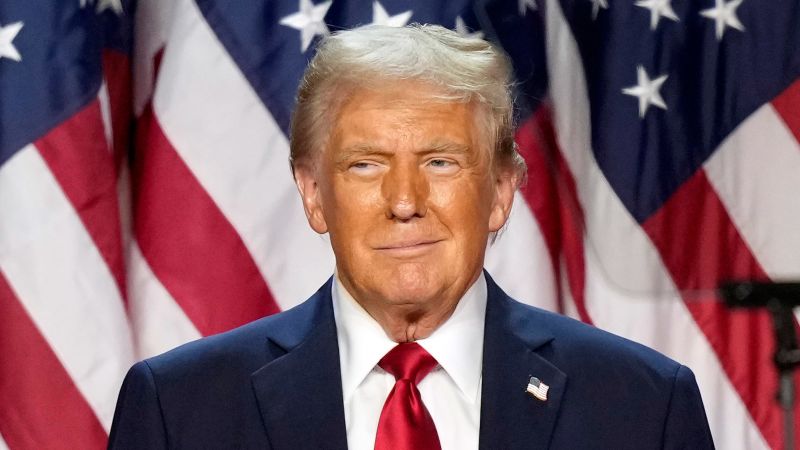CNN
—
America’s allies and foes alike have spent the past five days speculating about what Donald Trump’s re-election will mean for their economies, security and the world’s grinding wars.
Similar anxieties are brewing among diplomats gathering in Azerbaijan’s capital, Baku, on Monday for the COP29 climate talks — and for good reason: Trump has vowed to again pull the United States from the Paris Agreement, which binds nearly all the world’s countries to dramatically slash carbon pollution. Instead, he is poised to revive his “drill baby, drill” agenda to cash in on more American oil and gas.
As the Biden administration winds down, it is racing to send climate and environment funds to states and buttoning up last-minute regulations aimed at protecting the planet, one of its top climate officials said Monday.
“We still have plenty of work to do, and we have around 72 days, I think, to get it done,” said John Podesta, a senior White House adviser on clean energy who is also leading the US delegation at the UN climate conference in Baku, Azerbaijan.
Speaking to reporters at Baku on Monday, the first official day at COP29, Podesta said the Biden administration is “fully committed” to obligating outstanding funding under Biden’s climate law, the Inflation Reduction Act. The current administration has other major things left on its to-do list, including finalizing California’s federal waiver to set its own emissions standards and completing a federal review on US exports of liquified natural gas.
A U-turn on US climate policy could be disastrous for the planet, as it raises the risk of emulation. When America does something on the world stage, at least some countries tend to follow.
“Paris is one of those agreements where you need a critical mass of economic powers and emitters, past and present, to actually be able to address this challenge,” said Oli Brown, an associate fellow at the London-based think tank Chatham House.
Ahead of Trump’s inauguration, negotiators will ramp down their expectations in terms of what’s possible at the talks, he said.
“And it will allow big emitters to not take the kind of ambitious action that’s needed, because they don’t want to be at a competitive disadvantage to the US, if the US is unburdened by any sense of collective responsibility,” he told CNN.
The sheer amount of extra carbon pollution from an America unbound by any climate agreement is worrying enough. America is the second-biggest polluter of planet-heating carbon and it produces more oil than any other nation.
But the real sting is, that as the world’s biggest economy, the US has more power than any other country to fund climate change action in the developing world. Even if it stays in the Paris Agreement, an “America First” Trump administration is unlikely to be more generous with grants and loans for other countries’ green transition.
That alone sets the talks up for failure — their main aim was to agree to a transfer $1 trillion a year from wealthy countries and institutions to help developing nations build clean energy systems and to adapt to worsening extreme weather, like heat waves, floods, drought, storms and wildfires.
The COP29 talks were already shaping up to be lackluster. It’s the third year in a row that they’ve been held in a petrostate. Mukhtar Babayev, a state-oil company veteran, will preside over the event.
More striking than the list of leaders making opening remarks is the list of those who won’t bother going at all: US President Joe Biden, France’s Emmanuel Macron, European Union chief Ursula Von Der Leyen and even Claudia Sheinbaum, the climate scientist-turned-president of Mexico.
A number of leaders who were scheduled to go have since pulled out. German Chancellor Olaf Scholz canceled his appearance after his fragile three-way coalition government collapsed last week. Dutch Prime Minister Dick Schoof withdrew to deal with his own domestic crisis, as violent clashes erupted in Amsterdam around a football match contested by Israeli team Maccabi Tel Aviv. President Luiz Inácio Lula da Silva, who will host the climate talks next year in Brazil, bowed out after a head injury. There will be few powerful leaders to send Trump any kind of warning shots on climate.
A surprise presence at the talks will be officials from the Taliban as observers, Reuters reports, marking a rare appearance by the group at a multilateral event since seizing control of Afghanistan in 2021, after the US’ chaotic withdrawal.
For the planet, the timing of Trump’s win and wider global chaos couldn’t be worse.
The year 2024 will almost certainly end as the hottest on record. Back-to-back hurricanes supercharged by unprecedented ocean heat have killed more than 300 people in America this season alone.
The worry now is that with so little steam and an absent US, other countries may consider exiting Paris too.
Jonathan Pershing, who served as deputy climate envoy at the start of the Biden administration, however, says the worst outcome is more likely a hit to America’s reputation on the global stage for flip-flopping on its promises.
He pointed out that it took a whole year for the Biden administration to regain the trust of its allies on climate after Trump’s previous withdrawal from the agreement.
“It’s a depressing story,” he said. “It’s a consequence of the United States, which has exercised a leadership role, abdicating that role.”
Another concern among climate advocates has been that an absent US climate leader would open the door for China to step in and gain more global influence.
China is rapidly shifting its credentials as a major problem to the climate to one of its biggest solutions. It’s building wind and solar farms at a blistering pace – faster than any other country on the planet – and selling them to all corners of the globe. The country is constructing nearly two-thirds of the world’s utility-scale solar and wind power.
The European Union will have to step up, too to fill the void left by the US.
“I like to think about global climate politics as a tricycle: the EU, China and the US,” said Li Shuo, director of the China climate hub at the Asia Society Policy Institute. “You need at least two wheels to function at any given time. We just missed one wheel, and we need the other two to roll and carry us on.”
That’s what happened in Trump’s first term. America’s traditional allies simply waited it out and reengaged with the US after he lost the 2020 vote. But in 2024, there’s a greater sense of urgency, and climate inaction for another four years is a more dangerous prospect in a world with even more instability.
At the end of this year, the world will be at the mid-point of what science shows is a crucial decade for turning the tide on climate change. Fossil fuel pollution must be halved over that 10-year period to have any hope of avoiding crashing through the 1.5-degree warming threshold, beyond which humans will struggle to adapt.
The world is already 1.3 degrees warmer than it was before humans started burning fossil fuels at an industrial scale. Even if all the countries in the Paris Agreement cut carbon pollution by as much as they have pledged, at best they could limit warming to 1.9 degrees, according to a recent UN report. Their actual actions put the world on course for 2.3 degrees of temperature rise.
As climate scientists so often say, every fraction of a degree matters.
Extreme heat waves that occurred once in every 50 years at the start of the 20th century with 1 degree of global warming, for example, now occur once every 10, said Joeri Rogelj, a climate professor at Imperial College London.
At 1.5 degrees, a similar heat wave would happen once every six years, and at 2 degrees, it would be every four.
“So, something that for our great-grandparents was a unique extreme weather event, a once-in-a-lifetime challenge to deal with, will now become pretty much a regular occurrence at 2 degrees of warming,” Rogelj told CNN.
That might not be a huge problem for people who work in air-conditioned offices and homes, and who travel around in air-conditioned cars, but for poorer communities and those in developing countries, it’s an especially stressful future to imagine.
“If you’re working outside, engaged in heavy physical activity, and you live in homes that are poorly insulated, and you don’t have necessarily the financial means to pay for the additional energy for cooling, you will experience this heat very differently,” Rogelj said. “It’s clear that it will hit the poorest and most vulnerable segments of our population the hardest.”











